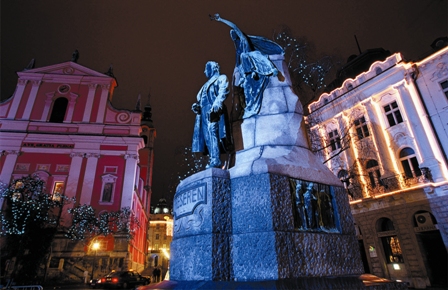
08/02/2014, by CLAS
Anthems of Slovenia (Part One): A Toast to Translation – France Prešeren’s Zdravljica
In the first of a two-part series, and to mark the Slovene Cultural Holiday, Dr David Denton from the Department of Russian & Slavonic Studies introduces us to the National Anthem of Slovenia and its writer, France Prešeren.
Prešeren Day, the Slovene Cultural Holiday (Prešernov dan, slovenski kulturni praznik), is a public holiday celebrated in Slovenia on February 8. It marks the anniversary of the death of the Slovene national poet France Prešeren who was born in Vrba on December 3, 1800 and died in Kranj on February 8, 1849. Established in 1945 to raise the cultural consciousness and the self-confidence of the Slovene nation, Prešeren Day was declared a work-free day in 1991. It has come to represent a celebration of Slovene culture. On February 7, the eve of the holiday, the Prešeren Awards and the Prešeren Fund Awards, the highest Slovene recognitions for cultural achievements, are conferred. Prešeren Day is not only celebrated in Slovenia, but by Slovene communities all around the world.
To mark the occasion the Faculty of Arts (Filozofska fakulteta) of Ljubljana University is publishing a collection of translations in twenty-five languages of one of Prešeren’s best-known pieces, the poem Zdravljica (A Toast). The book includes a foreword written by eminent Slovene literary scholar Professor Boris Paternu analysing Prešeren’s literary achievements and in particular the significance of Zdravljica for Slovene nationhood. The foreword has been translated by a member of staff within the Department of Russian and Slavonic Studies at the University Of Nottingham in conjunction with the Department’s first visiting Slovene language teacher, Ljubica Črnivec.
Prešeren is renowned for his lyrical poetry, but his poetry is also imbued with political ideas of independence and nationhood – aspirations most clearly expressed in Zdravljica. The poem was written in 1844 but as a result of the political ideas expressed within it the poem fell foul of the censor and did not appear in the collection Poezije (Poems) of 1847, a work which has come to represent a significant milestone in the history of Slovene literature.
It was only after the March Revolution of 1844 and the “Spring of Nations” of the Habsburg Monarchy that the poem was published in the Ljubljana newspaper Novice (News) on April 18, 1848.
Zdravljica has played an inspirational role in the Slovene’s people’s journey to national independence. In December 1944 in a “print shop” hidden amid the hills of Upper Carniola at Davča under Mt. Blegoš near Škofja Loka, Partisan forces under appalling conditions and at great risk produced a beautifully illustrated print-run of 1,500 copies of Zdravljica to mark the poem’s one hundredth anniversary. As Professor Paternu asserts, “it could be called a minor miracle of Slovene literary culture, one probably without parallel amid the ranks of other resistance movements in occupied Europe.”
It is understandable, therefore, that upon gaining independence in 1991 the Slovene people duly chose for their national anthem Prešeren’s Zdravljica set to the established musical arrangement of the ecclesiastic composer Stanko Premrl (1880-1965). More accurately, it was the seventh stanza Žive naj vsi narodi (God’s blessing on all nations) that was chosen, given its affirmation of national democracy, peaceful co-existence and its rejection of violence and war.
God’s blessing on all nations,
Who long and work for that bright day,
When o’er earth’s habitations
No war, no strife shall hold its sway;
‘Who long to see
That all men free,
No more shall foes, but neighbours be.
Translated by Janko Lavrin (1887 – 13 August 1986)
This translation is the work of Slovene novelist, poet, critic, translator and historian Janko Lavrin, who has a close association with Nottingham. He became Professor of Slavonic Studies at the University of Nottingham in 1923 and retired from the Department in 1952.
David Denton, Department of Russian & Slavonic Studies
(Photograph by A. Fevžer.)
No comments yet, fill out a comment to be the first

Leave a Reply